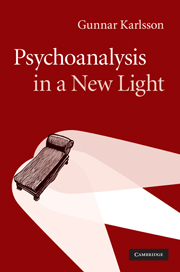Book contents
- Frontmatter
- Contents
- Preface
- Acknowledgements
- List of figures
- 1 Phenomenology and psychoanalysis
- 2 The life-world as the ground for sciences
- 3 A critical examination of neuropsychoanalysis
- 4 The conceptualization of the psychical in psychoanalysis
- 5 The libido as the core of the unconscious
- 6 The grounding of libido in the life-world experience
- 7 Beyond the pleasure principle: the affirmation of existence
- 8 The question of truth claims in psychoanalysis
- Concluding remarks
- References
- Index
5 - The libido as the core of the unconscious
Published online by Cambridge University Press: 05 June 2012
- Frontmatter
- Contents
- Preface
- Acknowledgements
- List of figures
- 1 Phenomenology and psychoanalysis
- 2 The life-world as the ground for sciences
- 3 A critical examination of neuropsychoanalysis
- 4 The conceptualization of the psychical in psychoanalysis
- 5 The libido as the core of the unconscious
- 6 The grounding of libido in the life-world experience
- 7 Beyond the pleasure principle: the affirmation of existence
- 8 The question of truth claims in psychoanalysis
- Concluding remarks
- References
- Index
Summary
In the previous chapter I argued that the unconscious lies on the border between the ego's conscious intending and a body-ego experiencing. The character of the unconscious was tied to human sexuality. In this and the following chapter, I would like to elaborate on the significance of sexuality for the concept of the unconscious (as a system). From the very beginning, sexuality has had a central position in the theory making of psychoanalysis, and for Freud played the role of explaining pathological suffering. Thereafter the significance of sexuality in the understanding of psychopathology has diminished. Today there are well-known French psychoanalysts who claim that sexuality has been neglected within the psychoanalytic movement (Green 1996, 2003; Laplanche 1999b). Laplanche points out how infantile sexuality has been lost with Freud's successors (Laplanche 1999b: 236–7; italics in the original):
If it is difficult to grasp infantile, non-genital sexuality – precisely as in our anecdote, where alimentary function and pleasure are not distinguished from oral sexuality, with its pleasure, its zone, its specific object – then it will be, purely and simply, abandoned. Reference will still be made to orality (anality) or to oral (anal) object relations, but practically no longer at all to oral or anal sexuality. Who amongst the Kleinians ever speaks now of infantile sexuality? Who is interested in pre-genital erogenous pleasure?
- Type
- Chapter
- Information
- Psychoanalysis in a New Light , pp. 93 - 116Publisher: Cambridge University PressPrint publication year: 2010



